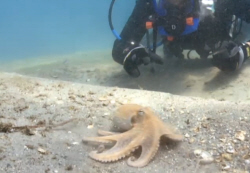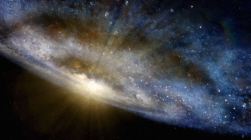Insatiable Quest
Common Octopus - Octopus vulgaris
What is Life?

Evolutionary Drive
You know, it may not look like it, but underneath this flyover, just out in the shallow water, is one of the best places in the world to find a
particularly interesting animal. It's an animal that's evolved to make the most of the information its eyes can provide.
Well, what we are going to do to find some octopus. And it's, as you say in physics, nontrivial. Because they've developed a beautiful way of
camouflaging themselves.
They change colour. Their cells and their skin change colour to match their surroundings. It's an ability that we don't possess, of course. It
makes them very difficult to find.
There he is, look. There, look at those colours. What a remarkable creature. Although the octopus is a mollusc, like slugs and snails, in many ways, it
seems more similar to us. It's believed to be the most intelligent invertebrate. It's brain contains about 500 million nerve cells, about the same
as a dog's.

Common Octopus

Intelligent Octopus
If you want an example of alien intelligence here on Earth… that must surely be it.
And it's used that brain to develop some remarkable abilities. It's become a skilled mimic. It can rapidly change not only its colour, but its
shape, to match the background. Some species even do impressions of other animals. They've become cunning predators, and adept problem-solvers.
They've even been reported to use tools. All these skills are signs of great intelligence, but they also rely on an acute sense of vision.
Look at those big eyes surveying the surroundings. Checking us out. Camera eyes, just like mine, and they are vitally important for allowing
the octopus to live the lifestyle it does, so a individual animal in the same way that I'm a visual animal.
The octopus is one of the only invertebrates to have complex camera eyes. Like our eyes, they capture detailed images of the world. And their
brains have evolved to be able to extract the most information from those images. The optic lobes make up about 30% of the octopus' brain. The only
other group that is known to devote so much of its brain to visual processing is our group. The primates – the most intelligent vertebrates.
I think it's a fascinating thought that intelligence is a result of the need to process all the information from those big, complex eyes.
What's so compelling about the octopus' intelligence is that it evolved completely separately to ours. We last shared a common
ancestor's 600 million years ago. An ancestor that had neither eyes nor a brain. But we've both evolved sophisticated camera eyes, and large,
intelligent brains. It suggests a tantalising link between sensory processing and the evolution of intelligence.

Hubble Telescope
Sensing has played a key role in the evolution of life on Earth. The first organisms were able to detect and respond to their immediate
environment, as paramecia do today. But as animals evolved, and their environments became more complex, their senses evolved with them.
Developing the mechanisms to let them decode vibrations and detect light. Allowing them to build three-dimensional pictures of their
environments, and stimulating the growth of brains that could handle all that data. But for one species, the desire to gather more and
more sensory information has become overwhelming. That species is us.
This is the closest thing to hallowed ground that exists in a subject that has no saints, because that telescope is the one that Edwin
Hubble used to expand our horizons, I would argue, more than anyone else before or since.

Andromeda
In 1923, Edwin Hubble took this photograph of the Andromeda Galaxy. You can see his handwriting on the photograph. He did it by sitting
here night after night for over a week, exposing this photographic plate. Now, at the time, it was thought that this misty patch you see in
the night sky was just a cloud, maybe a gas cloud in our own galaxy, but Hubble, because of the power of this telescope, identified individual
stars, and crucially, he found that it was way outside our own galaxy. In other words, Hubble had discovered this is a distant island of stars.
We now know it's over 2 million light years away, composed of a trillion suns like ours.
Hubble demonstrated that there is more to the universe than our own galaxy. He extended the reach of our senses further than we could have
imagined. With the help of the telescope, we could perceive and comprehend worlds billions of light years away.
There is a wonderful feedback at work here, because the increasing amounts of data delivered by our senses drove the evolution of our brains, and
those increasingly sophisticated brains became curious and demanded more and more data. And so we built telescopes that were able to extend our
senses beyond the horizon and showed us a universe that's billions of years old and contains trillions of stars and galaxies.
Our insatiable quest for information is the making of us.




